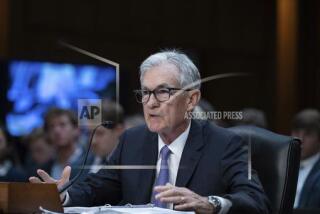Warns About Recession : Dollar Has Dropped Enough, Volcker Says
- Share via
WASHINGTON — Federal Reserve Board Chairman Paul A. Volcker, reasserting that the value of the dollar has fallen far enough to begin to reduce the nation’s massive trade deficit, Tuesday warned Congress that pushing the dollar still lower could stall economic growth worldwide and eventually provoke a recession.
Testifying before a Senate Banking, Housing and Urban Affairs subcommittee, Volcker also warned that protectionist measures proposed by Democratic lawmakers would make matters worse by shrinking world trade at a time when economic expansion is needed to solve existing imbalances.
Volcker’s testimony came as several congressional committees continued work on bills designed to improve the trade competitiveness of American industries in world markets.
He urged Japan and West Germany to fulfill conditions of the trade accord reached Feb. 22 in Paris by stimulating their economies to absorb a greater share of the world’s exports. But he also said that the Paris agreement was working by fostering cooperation. “It has been successful and continues to be successful,” he said. “It is in force, and we certainly favor its continuation.”
The remarks seem designed to calm financial markets, where heavy bouts of dollar selling against the Japanese yen drove the U.S. currency to a record low against the yen. They came as finance ministers and central bankers of the top industrial powers gathered for their talks at the International Monetary Fund and World Bank.
Volcker, often portrayed as at odds with Administration policy on monetary exchange policies, made a special point in his prepared testimony of endorsing the February accord, in which the United States, Japan, Canada and the leading European economic powers agreed to coordinate fiscal policies aimed at faster world economic growth.
“The clear danger now in most other industrialized countries is that growth may be slowing further,” Volcker said.
In that situation, he said, further declines in the value of the dollar, which tend to make U.S. goods cheaper and foreign goods more expensive on world markets, “could well be counterproductive. . . . . Excessive volatility in exchange rates could jeopardize instead of speed the process by further impairing prospects for investment and growth in the (trade) surplus countries.”
Times Staff Writer Tom Redburn contributed to this story.
More to Read
Sign up for Essential California
The most important California stories and recommendations in your inbox every morning.
You may occasionally receive promotional content from the Los Angeles Times.













